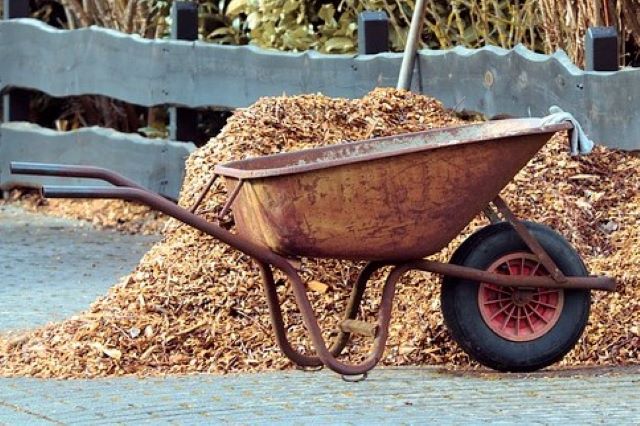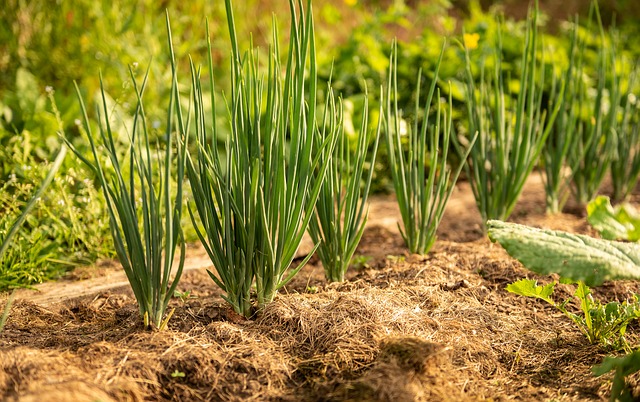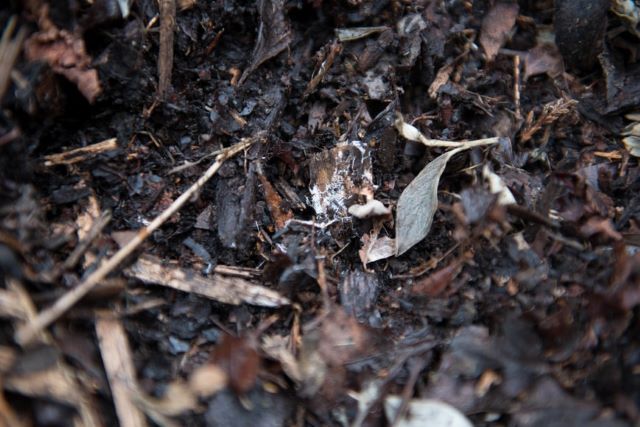Any gardener knows that mulch can be a very useful tool. I use it to overwinter my strawberries and to help control moisture levels in the garden. But if mulch is so useful, why does it sometimes smell so bad?
In this post, I’ll get into reasons why mulch can smell bad, what it means when it smells bad, and what you can do about it. Keep reading to learn more.

In short, mulch often smells bad because of anaerobic conditions, but dyes and natural decomposition can also create bad smells. Luckily, all of these are treatable or preventable.
Related: Best Organic Mulch for the Garden | Should You Use Coffee Grounds in the Garden?
Table of Contents
What Should Healthy Mulch Smell Like?
To know if your mulch smells bad, it’s first important to know what mulch should smell like. A good mulch will smell like wood or sawdust (as that’s what it’s made of), or a bit like fresh compost.
While the smell of compost can sometimes be a bit stinky, it is a smell that most gardeners are used to. Many people actually enjoy the smell of mulch. If your mulch smells worse than normal compost and is so bad that it bothers you, then you know it might not be the best.
Mulch is made of living materials, and as such, it will decompose over time. The process is controlled mostly by small microbes, often bacteria and fungi. Actinomyces, a type of Actinobacteria, are one of the most common culprits. Their work is important, as it releases nutrients that can be good for plants, as long as the process occurs with enough oxygen.
This decomposition can cause smelly odors, especially if it’s organic mulch. But decomposition is necessary and good, and the smells it creates shouldn’t be excessively bad or powerful.
If your mulch smells extremely sour, or the scent is enough to bother you consistently, then you should start considering the reasons why mulch might smell bad.

Mulch Smells Bad Due to Anaerobic Conditions
As I mentioned above, mulch will decompose as time goes on. When it occurs in the right situations, this decomposition is natural and healthy. However, that relies on one important thing: oxygen.
When mulch decomposes without access to enough oxygen, it’s known as anaerobic decomposition. In anaerobic conditions, decomposing mulch will create extra acetic acid, hydrogen sulfide, and/or methane gas, which will seep into the air and the soil.
This process can cause mulch to smell like manure (which mulch doesn’t usually contain), rotting eggs, ammonia, especially strong vinegar, or silage. These smells are very strong, and most of the time when mulch smells bad, it’s because of this issue. So what creates anaerobic decomposition in mulch?
Anaerobic conditions occur when mulch is too compacted to let enough oxygen flow through it. This is especially common with commercial mulch, and you will sometimes find that mulch you’ve just bought will already smell bad.
When commercial mulch is made, it is often stored in large piles. These piles compress the mulch, not leaving enough space for air. Then, it is stored in airtight bags, even further reducing access to oxygen.
Mulch in your own garden can also have this problem. If it’s all piled together compactly, or laid too thick, it can create anaerobic conditions that lead to mulch smelling bad. But what’s wrong with mulch that has gone sour like this?
Problems Caused by Sour Mulch
Sour mulch doesn’t just smell bad; it can be bad for plants. Those extra chemicals sour mulch produces— acetic acid, hydrogen sulfide, and methane gas— will eventually seep into the soil and, by extension, your plants.
This can and will damage your plants. They will stop growing, or grow much more slowly. The leaves will start to turn yellow, or look sunburnt with drier patches that are yellow-brown. Soon, the plants will begin to droop and wilt.
Within just a couple of days, sour mulch can completely kill plants. So it’s good to check your mulch before putting it in your garden. If it smells bad, you need to fix that before you give it to your plants.
How to Fix Anaerobic Conditions in Mulch

Luckily, anaerobic conditions are easily remedied, and you don’t have to throw out sour mulch. This means you don’t have to waste all that mulch you got.
Because sour mulch is caused by mulch not getting enough air, the solution is easy: give it more air!
To fix sour mulch, find a clear, hopefully sunny place in your yard. Spread the mulch out as thin as you can, not piling it up or compacting it, but letting it have space. Then, simply give it space and time to do its thing.
The mulch will continue decomposing, but this time with oxygen. Within just three to five days, this should counteract the effects of the previous anaerobic conditions. The mulch will start smelling better as the harmful byproducts go away, and aren’t produced more.
To help with washing away those smelly chemicals, you can also water the mulch while it’s decomposing. This will get rid of the smell faster, and help the mulch decompose in better conditions.
Another way to speed up the process is to move the mulch around every now and then, also called “turning” it. This helps it spread out, get more air, and make sure that it can decompose in the way it likes.
If your bad-smelling mulch is already around your plants, you have a few options. You could remove the mulch and give it time to fix itself, but that may not be very doable.
But that doesn’t mean you’re out of hope. You can still help the mulch smell better by moving it around, giving it more oxygen. You can also water it frequently while doing this, to help leech out the extra byproducts and wash them out of both the mulch and the soil, so they don’t harm your plants.
Another way you can help improve the quality of mulch around your plants is to poke holes in it every so often. Try to get at least an inch deep, and make quite a few of these holes, using your finger or a tool like a spade. This lets oxygen into new places in the mulch, and prevents anaerobic conditions from building up.
When you are putting mulch around your plants, make sure not to pile it on too heavily. The mulch should be a maximum of 2-3 inches thick. Any more than that, and you risk creating anaerobic conditions, as well as suffocating your plants.
And lastly, don’t pile up mulch in huge, compact piles, and definitely don’t store it in airtight bags! If you do need to store mulch somewhere, make sure that it is open and well-ventilated, so air is passing over it. And instead of storing it in bags, you can spread it out on a tarp or other open area. Be sure to still turn it often, so it doesn’t all get clumped in one position and start getting compacted.
Colored Mulch That Smells Bad
While the usual culprit of bad-smelling mulch is anaerobic conditions, there is one other common cause: colored mulch.
Many people buy colored mulch because it looks better, and they want their gardens to look nicer and more appealing. But while colored mulch may not be harmful to plants, it can be a lot more smelly, so keep that in mind when deciding to buy it.
Mulch that’s dyed red can be dyed with red oxide or chromate copper arsenate. Both of these can create foul smells when they get wet or really hot. Then, your whole garden will stink when it rains or gets really sunny!
Black-dyed mulch can have similar issues, but because of carbon dyes. Again, these dyes don’t usually harm plants, but they do create smells that aren’t pleasant.
Lastly, there’s black rubber mulch. This is exactly what it sounds like: mulch made out of rubber. Because of its material, this mulch can often smell like tires, overwhelmingly so. Luckily, this smell will usually fade within a couple of days.
However, even if the smell fades, it doesn’t mean the problem is solved. Black rubber mulch is often used by gardeners because it doesn’t decompose, so it can be used longer, and doesn’t go sour. But some science suggests that over time, chemicals from the rubber will seep into the soil, and cause harm to plants. And even if that wasn’t the case, it still doesn’t provide all of the benefits of organic mulch, like the helpful nutrients from decomposition and the improved control of moisture.
Some Favorite Gardening Products
Further reading:
